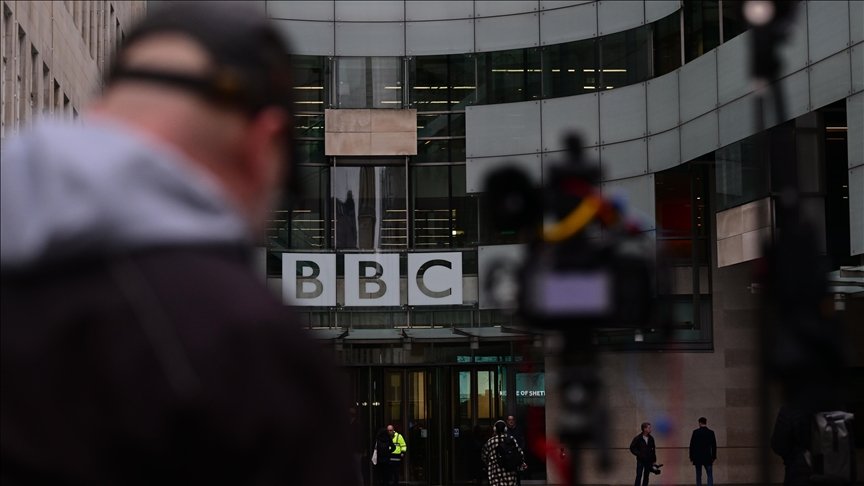The BBC is facing a governance crisis after its director general and head of news resigned amid an impartiality row, Trump’s legal threat, and rising doubts over board leadership and future stability.
WEBDESK – Imran Malik – November 25, 2025
The BBC is facing one of its most turbulent moments in years, grappling with leadership gaps, political pressure, and mounting scrutiny following the sudden resignations of Director General Tim Davie and Head of News Deborah Turness.
The crisis deepened this week as BBC chair Samir Shah appeared before the UK Parliament’s Culture Select Committee — only to be criticized for failing to convince lawmakers that the broadcaster is in “safe hands.”
A leadership vacuum at the top
The twin resignations were triggered by the fallout from a leaked editorial memo criticizing how Panorama edited a speech by U.S. President Donald Trump. The ensuing controversy sparked internal debate, White House anger, and renewed accusations of bias.
The BBC apologized for giving a “mistaken impression” that Trump made a direct call for violence on January 6. But President Trump’s legal team has threatened to sue the BBC for defamation and demanded financial compensation — a request the corporation has firmly rejected.
With two of its most senior leaders gone, Shah acknowledged to MPs that the corporation must now urgently recruit a new director general and begin considering a new deputy DG role because “the job is too big for one person.”
Committee questions: Is the BBC in safe hands?
Committee chair Dame Caroline Dinenage publicly questioned whether Shah has a strong enough grip on the crisis, calling his responses “wishy-washy” and lacking confidence in the board’s ability to stabilize the organisation.
“We were really looking for hard evidence that the BBC board are going to grip this,” she said. “I’m not entirely convinced that they can and they will.”
She warned that the BBC cannot operate without both a director general and a strong chair, saying MPs were “not wildly enthused that the board is in safe hands.”
Trump’s threat adds political heat
The controversy escalated after the leaked memo revealed concerns about how the Trump clip was edited. The BBC eventually apologized, but Shah admitted the process took too long due to internal disagreements over the wording.
Trump’s team maintains the edit was defamatory.
The BBC insists there is no basis for a lawsuit and refuses to pay any damages.
The memo also flagged alleged “systemic failings” across several BBC departments, including BBC Arabic’s coverage of the Israel–Gaza conflict and reporting on transgender issues — an assessment the BBC denies.
BBC board pushes back
Appearing alongside Shah, board member Sir Robbie Gibb — a former Downing Street communications chief — dismissed allegations that he orchestrated a political coup to oust the DG as “complete nonsense.”
Other external advisors said the leaked memo reflected personal interpretations rather than institutional bias.
Shah told staff on Monday that restoring confidence, reviewing editorial standards, and strengthening internal oversight would be his top priorities.
What’s next for the BBC?
Despite the turmoil, Shah insisted he would “steady the ship” and “fix it.” He announced:
-
A swift search for a new director general
-
A review of the BBC’s Editorial Guidelines and Standards Committee
-
An assessment of whether earlier actions on the memo were “appropriate”
-
Efforts to ensure governance reflects “a broad range of voices”
But with a leadership vacuum, parliamentary scepticism, and political pressure from both Westminster and Washington, the BBC’s path forward remains uncertain.
For now, the world’s oldest public broadcaster — and one of its most trusted — is in a critical transition, trying to reassure both audiences and lawmakers that it can weather one of its most significant governance crises in decades.



5 Comments
Giờ hãy cùng tìm hiểu chi tiết hơn về những đặc điểm nổi bật đã giúp 188v game ghi điểm trong mắt cộng đồng người chơi.
Yo, been hitting up abc888slot lately! Feels kinda retro but pays out alright. Definitely worth a look if you’re bored with the usual stuff. Check it out here: abc888slot
Demopgslot é top pra quem quer treinar antes de apostar de verdade! Dá pra testar os jogos sem gastar nada. Ótima dica pra iniciantes! 😉 demopgslot
Alright, checking out 6fff! Heard some buzz about it, hoping for some good vibes. Let’s see what it’s all about! I’ll post later if it delivers the goods! Find out more here: 6fff
Alright,vip777slotlogin… not bad at all! I really like the variety of slot games they have. I’ve hit a few small wins, so I’m happy! Might get lucky someday. vip777slotlogin